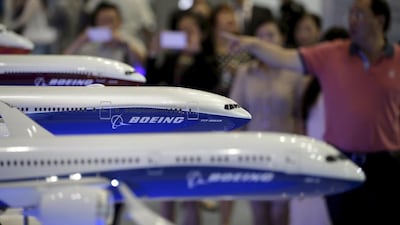The US aerospace and defence company Boeing expects orders for its commercial aircraft from Turkey this year, a senior company executive said on Monday.
The aircraft manufacturer expects a growth in orders from the Middle East to top 6 per cent – beating the global average – despite the decline in oil prices.
“In the Middle East, yes, we are seeing some issues related to the oil prices right now, but we are still remaining with our own growth forecast for the year,” said Bernard Dunn, president of Boeing Middle East, North Africa and Turkey, at an event in Dubai.
“We are expecting some good things out of Turkey this year as well.”
Mr Dunn declined to give further details.
Turkish Airlines is considering buying Boeing's 787 aircraft, Ahmet Bolat, the carrier's chief investment and technology officer, told The National in November.
Turkey’s low-cost carrier, Pegasus Airlines, last month ordered five 737-800 aircraft, valued at about US$505 million based on expected list prices at delivery.
Gulf airlines are big customers of Boeing’s long-haul aircraft, the 777-300ER.
Emirates is the largest operator of the 777 family.
Boeing projects that the region as a whole will need 3,180 new aircraft over the next 20 years, valued at $730 billion.
The manufacturer is shedding about 4,000 jobs this year as it seeks to control costs, after its European rival, Airbus, beat it in orders last year.
Mr Dunn declined to comment on the effect of the job cuts on the Middle East region.
dalsaadi@thenational.ae
Follow The National's Business section on Twitter

